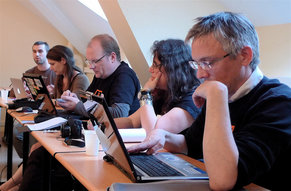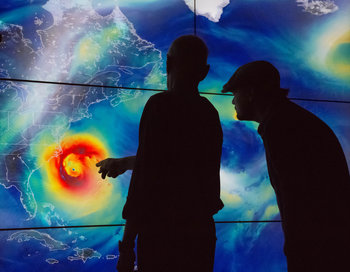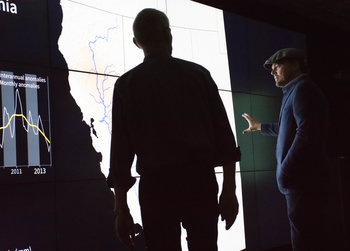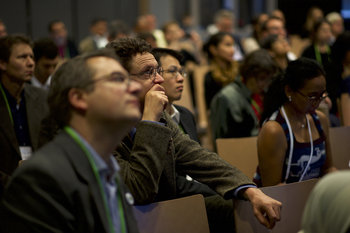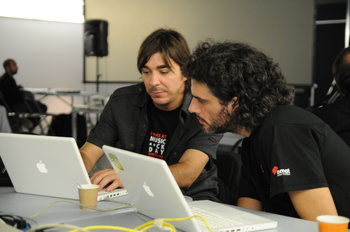
Art
Where science seeks to defeat ambiguity, art embraces it as a valuable aesthetic that can be used to communicate abstract concepts or provoke a sense of wonder.
Architecture
Architecture can make use of ambiguity to create structures and spaces that are difficult to comprehend. People may value such structures more than those that are perceived as obvious and well-delineated.
Music
Ambiguity is used in music to defy expectations and create rich works that can be interpreted in many different ways. This is most obvious in lyrics but can also be achieved with any aspect of music such as an ambiguous rhythm.
Preserving Ambiguity
Preserving ambiguity is the practice of minimizing assumptions and constraints in the early stages of a creative process. This allows brave ideas to surface followed by a process of validation.
Uncertainty
Uncertainty is a past, current or future unknown. Ambiguity is uncertainty as it applies to information. This is a subtle difference as we can only perceive the world with information. Generally speaking, uncertainty and therefore ambiguity is a common and inescapable feature of life. The past is often uncertain because information fades. The present can be uncertain in fast moving situations where there is little time to discover information. The future is uncertain as it can rarely be predicted with complete accuracy.
Risk
Risk is the potential for losses. This largely a result of uncertainty as you could avoid losses if you could predict the future with certainty.
Ambiguity Effect
The ambiguity effect is a tendency for people to avoid making choices that involve ambiguity. This can be irrational as it can result in suboptimal decisions. For example, a shopper may avoid purchasing bread because there is no indication of whether the bread is organic. This can occur when the same customer would buy the bread both if it was organic and if it wasn't organic.
Ambiguity Tolerance
The ambiguity effect doesn't apply to all people as some individuals have a high tolerance for ambiguity. For example, individuals may thrive on risk taking and be perpetually optimistic that unknowns will produce favorable outcomes.
Fuzzy Logic
Traditional systems of logic only handle true and false with nothing in between. In other words, logic often can't handle ambiguity. Fuzzy logic is a class of logic that can represent ambiguity as probabilities. This is useful for real world situations with unknowns such as a robot that needs to navigate a busy street with unpredictable pedestrians.
Definitional Ambiguity
A word that has an vague or fundamentally disputed definition such that it is unclear exactly what it means. For example, the definition of "dimension" as it applies to physics is considered somewhat unresolved.
Ambiguous Language
Natural languages such as French, English and Japanese are inherently ambiguous such that an educated guess is often required to interpret meaning. This is one of the core reasons that it is difficult to fully master a second language. Ambiguity serves a function in language as it tends to make speech and writing more brief, entertaining, humorous and colorful. However, ambiguity can also have negative impacts as it can lead to misinterpretations. The following are common types of ambiguous language.Lexical Ambiguity | A word with multiple meanings. For example, "the fisherman went to the bank" is ambiguous because "bank" could be a financial institution or the shore of a river. |
Structural Ambiguity | Ambiguity in the syntax and semantics of a language. For example, "Kim and Henry are married." Technically, this sentence doesn't state that they are married to each other but this may be assumed. Structural ambiguity is used to keep things short but can lead to misinterpretations. This is commonly used in comedy. For example: Outside of a dog, a book is man's best friend. Inside of a dog it's too dark to read.~ Groucho Marx |
Anaphoric Ambiguity | Language that relies on context for its meaning. This is usually somewhat ambiguous but people can typically follow and understand if it is properly structured. Anaphoric ambiguity allows language to be more concise and interesting as opposed to restating context in a repetitive fashion. For example: "Susan likes Mary. She likes everyone." Technically, the word she could refer to either Susan or Mary but it is generally understood that she refers to Mary because Mary is the subject of the previous sentence. |
Idioms | A phrase that is generally understood to mean something other than its literal meaning. For example: The English professor told the class that a double negative often can have a positive meaning but a double positive never has a negative meaning. A voice from the back of the class retorted "yeah, right"The joke above plays on the idiom "yeah, right" that literally sounds like a positive affirmation but is generally understood to mean "I don't believe that." |
Pun | A joke that exploits two different meanings of the same word. For example, a bicycle can't stand on its own because it is two tired. |
Double Entendres | A phrase that can be interpreted two ways such that it has a double meaning. For example, "Obesity study seeks larger test group" where larger could refer to the number of participants or their weight. |
Oxymoron | A seemingly contradictory phrase that nonetheless may convey meaning such as "organized chaos." |
Personification | Treating non-human entities as if they were people. For example, "the rain hates me." |
Paradox | A statement that is seemingly impossible that may be designed to provoke thought such as "this statement is a lie." |
Hyperbole | An exaggeration that is designed to be detected by its degree of absurdity such as "I'm so hungry I could eat a cow." |
Allusion | A brief reference to a person, place, event or concept either real or fictional. This requires prior knowledge to follow. For example, you need work experience to get a job to get work experience, it's a real catch-22. |
Transferring knowledge from one domain to another with a comparison that is literally inaccurate but informative nonetheless. For example, "love is war". Note: a metaphor is a type of analogy. | |
Allegory | An extended metaphor that is open to broad interpretations. For example, the book Animal Farm by George Orwell is ostensibly about farm animals but is an allegory for the Russian Revolution of 1917 and the Stalinist era of the Soviet Union. |
Metaphysical Conceit | An extended analogy that is inaccurate but admirable for its literary prowess. For example, literature that likens business with being at sea in a storm. The audience may remain conscious of the inaccuracy of such a comparison but may appreciate it nonetheless for its poetic truth. |
A storytelling technique that gives a central character a strong motivation that is never explained to the audience. | |
An attempt to sound like you have evidence to support a claim without actually saying anything meaningful. For example, "many experts agree ..." | |
Doublespeak | Language used to conceal the truth. For example, in George Orwell's 1984, the war department of the government is known as the "Ministry of Peace", the propaganda department is the "Ministry of Truth" and the "Ministry of Plenty" is tasked with making sure that the population remains poor and dependent on the state. |
Vagueness | General non-specific language such as "Germany is a big country with a very interesting culture." This doesn't convey much meaning and is open to much interpretation. For example, "big" could refer to population, economy or land size. The term vagueness has negative connotations that implies information that isn't helpful. |
Open-ended Language | A more positive way to refer to language that is intentionally vague so as to allow for interpretation. For example, instructions to customer service representatives to "always treat the customer with respect." |
Self-reference | Circular language such as a definition that uses the word being defined as its core content. For example, "management is the act of managing." This tends to be unhelpful. |
Puffery is a legal principle that inaccurate language may be used in marketing and sales if no reasonable person would take such statements literally. For example, if a salesperson says "this is the best car in the world" the customer should understand that this isn't literally true. This gives a certain degree of creative license to marketing messages that allows for ambiguity such as analogy and hyperbole. |
| Overview: Ambiguity | ||
Type | ||
Definition | Uncertain information. | |
Related Concepts | ||












